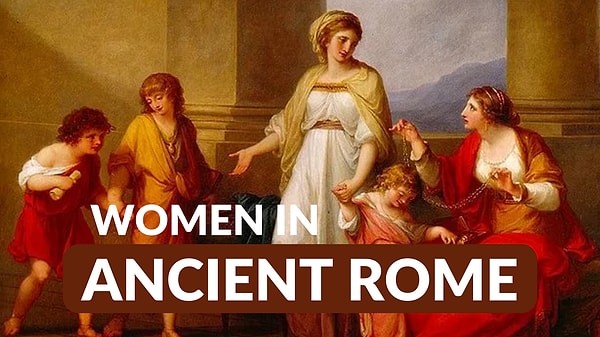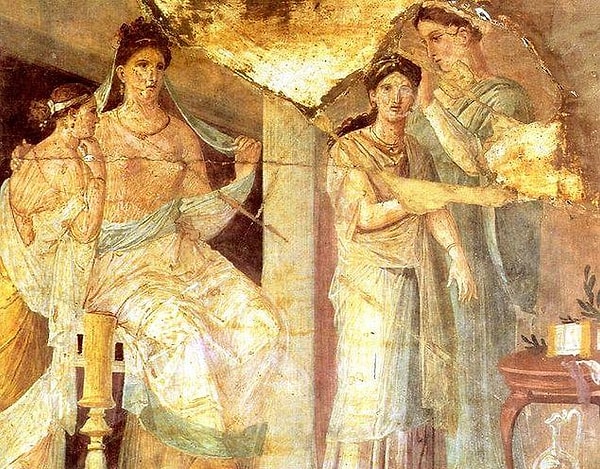Ancient Rome was patriarchal and women's behavior was controlled by men. Women's purpose in life was to serve as wives and mothers. While some had relatively more freedom, they were never equal to men. They were not given the freedom to be educated or a platform to be heard, so their stories were not told. We have compiled for you what is unknown about the women of ancient Rome.
Forced Femininity: The Shocking Truth About Women's Lives in Ancient Rome

In ancient Rome, men and women were seen as unequal in everything.

Women were responsible for the man in their lives. They had no control or power over their own lives. Before marriage they had to answer to their fathers, afterwards this authority passed to their husbands. When Augustus came to power, he changed many laws concerning women; women with three or more children were given legal independence.
Ancient Roman women of the upper class spent most of their lives at home.

When they reached their mid-twenties, they married quickly because any woman who was not married by the age of 20 was considered a deviant. After Emperor Augustus came to power, he passed a law that imposed a heavy fine on any woman who did not marry after the age of 20. Women from the lower classes were forced to work in backbreaking jobs like the men in their families.
In fact, their daily lives were not very different from the lives of men in the same class. Even though they were considered legally inferior to men, they led very similar lives. Women of all classes had little or no access to education. There were very few women who managed to get a good education. But they too were viewed with extreme suspicion. Education for women in this period was simply to have the knowledge to raise their children.
In this period, marriage was not so much a romantic relationship between two people, but a political tool to bring two families or groups together.
In most cases, politicians would marry and immediately divorce when they wanted to improve their political relations. Marriage was also seen as a religious duty. The ancient Romans believed that they owed it to the gods and goddesses to produce children. The most common type of marriage in ancient Rome was the manus marriage, in which the woman was seen as property transferred from her father to her husband. She had no legal rights and all property in her name belonged to her husband after their wedding.
Manus marriage involved several religious rituals.
The groom would offer money to the bride's father to buy the woman. After the man and woman had lived together for a year, the woman was considered to be under the control of her husband.
In ancient Roman society, women had almost no legal status.
Women were expected to serve in the home. As they were integral figures in the lives of their children, they had to ensure the smooth running of the household. Women were also expected to hold themselves back, be supportive and willing to sacrifice for their husbands and children. A woman's primary role was to give birth. But in some cases, when physically immature girls were married off too early, there were deaths due to birth complications. Women were to be obedient, chaste, frugal, traditional, religious, plain and modestly dressed.
The Romans believed that both male and female gods created all humanity.
They did not specify whether the first human being was a man or a woman. Unlike Greek mythology, in Roman mythology men and women were not considered to belong to two different species.
A distinction had to be made between "respectable" women in ancient Roman society and those who were not.
Men demanded virgin wives because they thought that one can't marry a woman who had sexual intercourse before marriage. But the same men had sexual relations with prostitutes. The 'respectable' women of Rome wore a long dress, a mantle and a headband, while the 'other' women wore a toga. If respectable women were found to have committed adultery, they were punished by being forced to adorn togas in public. Other women had fewer rights than respectable women. For example, they were not allowed to sue for rape. If they were raped, the charge was related to the property damage suffered by the owner.
Although women were treated as second-class citizens in ancient Rome, there were women who managed to change history.
They did this either by working within the confines of their assigned gender roles or by subverting those roles and taking their rights by force. Women like Boudicca, Livia and Saint Helena are a few examples of such women. Boudicca led one of the English revolts against Rome. Livia was the wife of Emperor Augustus and mother of Tiberius. Saint Helena was the mother and personal advisor to Constantine.

